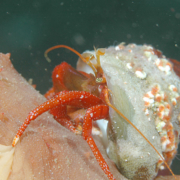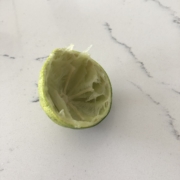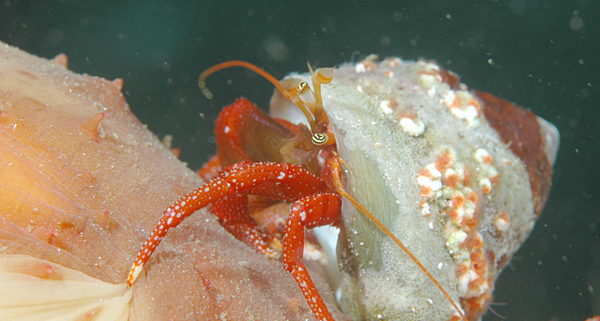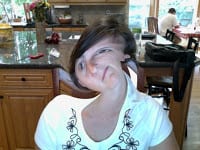Mixing My Metaphors…

Transferred from en.wikipedia to Commons., CC BY-SA 2.5,
and letting go.
Much of my personal work during the last four years of my life has followed the theme of letting go.
Watching my mother descend further and further into herself with Alzheimer’s, acknowledging that there wouldn’t be an opportunity to reconcile all of the questions I had and grieving as she stopped knowing who I was to her was a long, grueling process.
Mourning the end of my 23-year marriage and the loss of the person I’d considered my best friend for more than half of my life, moving to a new house and reimagining all of my plans for life after the girls moved out was unexpected and is still ongoing.
Moving my oldest daughter thousands of miles away to start college and beginning to understand that I don’t know most of what she does in any given day. Being prevented by the pandemic lockdown from helping her find her first apartment and her first car and from even traveling to share her 21st birthday with her was an exercise in equanimity and faith.
And now my youngest and her boyfriend are moving out to start their life and careers in Los Angeles and I’ve decided to uproot myself and leave Seattle. It has brought excitement and anticipation and many joyful hours as I dream of choosing just the right house in just the right neighborhood for me, slowly and deliberately filling it with things I love and that bring me peace, and strengthening my relationship with extended family who will live close by. But all of this letting go is also surfacing fear and anxiety and old thought patterns that can feel incredibly overwhelming.
Yesterday, I decided to steel myself and go down the rabbit hole. I started by making a comprehensive list of all the things I am afraid of. A specific, honest, detailed list of the things that are rattling around in my head and sparking little fires I feel like I have to put out all day long.
The next sheet of paper was dedicated to exploring “what if.” What if those things do come to fruition? What if fear #1 actually happens? What do I do? How do I manage it? Taking the fears one by one allowed me to remember that I have resources, I have experience and wisdom, and I can make a plan to tackle each of the (highly unlikely) scenarios I am imagining in my head.
Then I pulled out a third piece of paper and made a list of my touchstones. I asked myself, what are the things that remain constant and supportive and solid in my life? Who are those people? What are the practices I can engage in? Where can I seek comfort that is real and available to me? Making that list was really wonderful and affirming, and reminded me that I have people in my life who love me and see me for who I am, and I know how to calm myself with nature, reading, yoga.
At the bottom of that same piece of paper, I made a list of “not-touchstones.” These are things that, at first glance, seem to be solid and real and supportive, but they’re transient. The first thing on that list is my house. The familiar surroundings feel safe and comforting. I know the sounds and how the light falls and which couch is most comfortable for watching tv. This house served a purpose, to be sure. It was everything the girls and I were looking for when we left our old home, where we lived with their father. We chose it together and we made it a place where their friends were welcomed with love and laughter. And we have squeezed all that we needed out of this lime. We used all the juice, and neither of my girls needs to be here anymore. They are off on their own grand adventures and so, while I might feel comfortable in this place because it is familiar, it will keep me small and feel incredibly lonely without them in it.
The next not-touchstone is wishing for my mom. Imagining what she would have said or done to support me isn’t helpful because even when she was alive, she couldn’t have done anything; she didn’t know who I was anymore. I can absolutely talk to her and feel her presence, but wishing that she was physically here and able to come help me pack and dream with me will only keep me stuck.

The third one is this city. I’ve lived here for nearly 30 years and it has been glorious. I know the suburbs and the city’s neighborhoods. I have favorite restaurants and grocery stores and places to walk. I can get around with ease and I understand the local politics. And yet, this lime is just a husk now, too. I have had a really wonderful life here in Seattle and also, there is nothing left for me here. Staying here because I know it, I understand it, and it’s safe would be the wrong choice.
Years ago, I created a meditation for my youngest daughter when it became clear that she really struggles with transitions and big change. This morning, I used it myself. I had asked her to imagine she is a hermit crab in a shell that is really tight and too small. It’s not that there is anything inherently wrong with that shell, she just outgrew it. The scary part about looking for a new shell when you’re a hermit crab, though, is that you have to leave the old one to go hunting for the new one, and that means your backside is all soft and vulnerable while you look. And being out in the world, exposed, feels really scary. It can also be sad to leave behind that old shell. You chose it for a reason – maybe it was really pretty or just the right shape, and you knew its every contour and swirl. But that doesn’t change the fact that it no longer fits you. It served its purpose, and it’s time to go find the next shell you can love. Saying goodbye to that old one is sad and frightening, but you know if you stay there, you’ll be uncomfortable and you won’t move like you can. Shell-hunting is a leap of faith. It requires trusting that the next one is out there and you’ll find it in time, and you’ll grow to love it just as much as you loved that old one you’re leaving behind.
I’m shell-hunting. And knowing that it’s time to leave this old lime husk behind (see, I told you I was mixing metaphors) doesn’t make it any less scary, but knowing there’s no more juice in it for me is helping me keep my eyes forward. Because the past is a not-touchstone, too. I can be grateful for it, for what I learned and the people and things that helped me along the way, and I can also know that part of the reason I love it so much is because it is the past. I have to believe that staying small is the wrong thing to do here. I have to take this leap of faith and trust and rely on my real touchstones.








Leave a Reply
Want to join the discussion?Feel free to contribute!